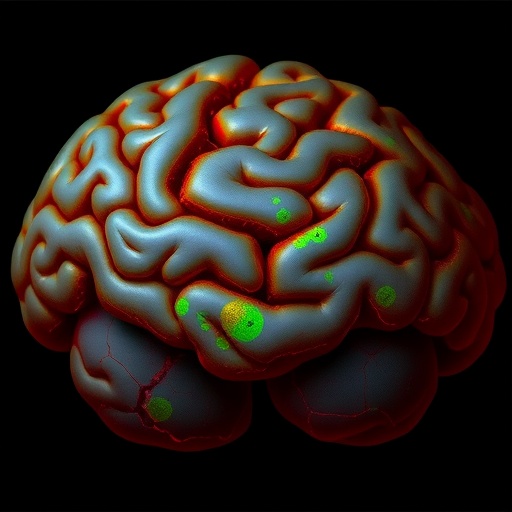In one of the most significant breakthroughs in neurodevelopmental research, a study led by Jiang, Zhang, and Xia has illuminated the crucial role of Fto-mediated m^6A modification in cerebellar development. This pivotal research unveils that the epigenetic regulation of RNA methylation is not merely a passive process but an active participant in the intricate dance of neuronal development and differentiation, particularly in the cerebellum. Such findings set the stage for a deeper understanding of not only cerebellar morphology but also the broader implications of RNA modifications in developmental biology.
At the heart of this research is the N^6-methyladenosine (m^6A) methylation, a prevalent modification found in eukaryotic RNA. It has traditionally been studied for its role in mRNA stability and translation. However, this study makes a compelling case for its essential role in the epigenetic reprogramming necessary for cerebellar formation. The cerebellum, responsible for motor control and cognitive processes, is deeply influenced by the genetic and epigenetic signals it receives during development. Therefore, understanding how m^6A modification facilitates these processes could unlock new avenues for addressing developmental disorders.
The research meticulously outlines how Fto—an enzyme responsible for demethylating m^6A—was found to be critically important for the differentiation of neural progenitor cells into mature neurons within the cerebellum. By examining Fto knock-down models, the researchers demonstrated that reduced levels of Fto resulted in significant developmental abnormalities within the cerebellum. The implications of these findings are profound, suggesting that insufficient m^6A modification can lead to compromised cerebellar development, which could potentially manifest in motor and cognitive deficits.
In their extensive experimentation, Jiang and colleagues employed state-of-the-art genomic and transcriptomic tools to analyze m^6A modification across various developmental stages. They identified specific target genes whose expression was altered in the absence of Fto activity. This revelation points toward a regulatory mechanism mediated by m^6A that fine-tunes gene expression profiles crucial for the proper development of cerebellar architecture.
This research does not merely advance academic understanding but opens possibilities for translational applications in medicine. Abnormalities in cerebellar function are implicated in several neurodevelopmental disorders, including ataxia and autism spectrum disorders. The relationship between epigenetic factors like m^6A and these conditions necessitates a robust investigation into potential therapeutic approaches that could ameliorate or correct developmental disruptions linked to epigenetic dysregulation.
The transition from basic science to clinical implications is profound. Understanding the mechanisms underlying cerebellar development can help inform treatment strategies for conditions that currently have limited intervention options. By exploring pharmacological or genetic methods to modify m^6A pathways, researchers could potentially restore proper developmental trajectories in affected individuals.
Additionally, this research fits neatly into a broader conversation about the role of epigenetics in health and disease. Epigenetic modifications have emerged as potential ‘master switches,’ capable of influencing cellular behavior in response to environmental cues. The need to understand how these modifications, particularly m^6A, will react to various stimuli throughout development is becoming increasingly critical in an age where the interplay between genetics and environment is a growing focus of study.
As the research community delves deeper into the role of m^6A in various biological processes, it is evident that Fto’s role in cerebellar development serves as a model for broader applications. From cancer biology to metabolism, the implications of RNA methylation across different tissues and developmental stages will likely provide insights that could revolutionize our approach to biomedicine.
Further investigating the molecular pathways involved in m^6A modification could prove to be invaluable, especially considering that the field is still in its infancy. More research is needed to uncover the complexities of how each component in this pathway interacts with cellular function. These nuances will hopefully lead to effective strategies in dealing with neurodevelopmental disorders and beyond.
Thus, the work of Jiang, Zhang, and Xia will undoubtedly resonate through multiple disciplines in both basic and applied sciences. The peel back of epigenetic layers to reveal the vital role of m^6A in neurological development marks a critical turning point in our understanding and could inspire a new generation of research aimed at deciphering the complexities of brain development and function.
In conclusion, the implications of this study are extensive and multifaceted, setting a promising trajectory for future research endeavors. The delicate balance that m^6A modifications maintain within the cellular landscape emphasizes the need for continued investigation into the intersection of epigenetics and neurodevelopment.
Understanding Fto-mediated m^6A dynamics may open doors to unprecedented applications in regenerative medicine and developmental biology. As science progresses, it is crucial to continue harnessing the power of epigenetic modifications like m^6A to inform therapeutic interventions and ultimately improve the lives of those impacted by neurodevelopmental disorders.
The findings presented in this study represent a remarkable leap forward in grasping the intricate mechanisms underlying cerebellar development. As the scientific community continues to unravel the complexities of epigenetic regulation, we are undoubtedly just scratching the surface of the essential roles these modifications play in the broader context of human development and health.
Subject of Research: Fto-mediated m^6A modification and its role in cerebellar development through epigenetic reprogramming.
Article Title: Fto-mediated m^6A modification is essential for cerebellar development through regulating epigenetic reprogramming.
Article References:
Jiang, J., Zhang, M., Xia, W. et al. Fto-mediated m6A modification is essential for cerebellar development through regulating epigenetic reprogramming. J Biomed Sci 32, 81 (2025). https://doi.org/10.1186/s12929-025-01176-0
Image Credits: AI Generated
DOI: 10.1186/s12929-025-01176-0
Keywords: m6A modification, Fto, cerebellar development, epigenetic reprogramming, neurodevelopmental disorders.




